168 Search Results for preschool
April 10, 2014
by Carole Zangari -
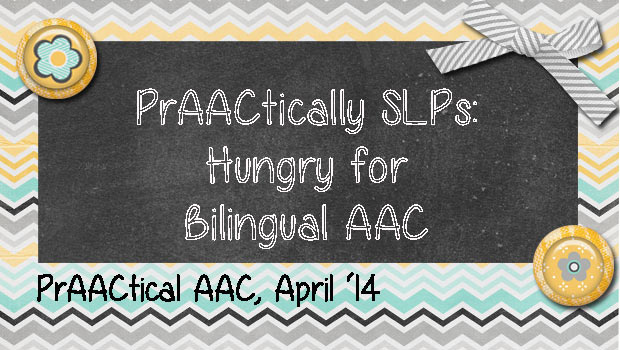
We are so excited to launch, PrAACtically SLPs, a new series featuring the voices of graduate students in SLP programs who do outstanding work in AAC. We start off with a wonderful group from the University of North Carolina at Chapel Hill. Allie Rodriguez, Caitlin Rich, and Megan Latta are second year SLP students who will be graduating in May. They recently concluded an AAC course taught by Dr. Penny Hatch, who continues to mentor them in the field of AAC and literacy. I met these energetic young professionals at the North Carolina Augmentative Communication Association Conference in February and was inspired by their passion. In this post, they tell us about their AAC experiences on a trip to Guatemala. Hungry for Bilingual AAC? Today, our population is becoming more culturally diverse, which, in turn, has caused our caseloads to reflect this change. There is a growing... [Read More...]
April 3, 2014
by Carole Zangari -
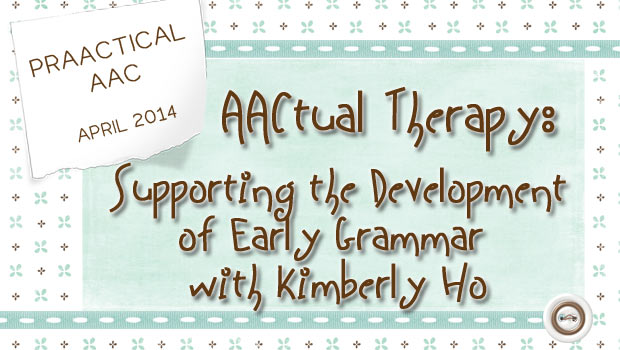
Our guest post for today is from SLP Kimberly Ho, an AAC specialist who operates a private practice, AAC Services. I met Dr. Ho many years ago when she was getting her master’s degree at Purdue University. She went on to get her doctorate and now consults for a number of public schools and works with individuals with AAC needs from preschoolers to adults. Kimberly is active in teaching (undergraduate and graduate courses), writing (published three articles in peer reviewed journals) and public speaking (15 presentations at regional, national and international conferences). In this post, she discusses some concepts in teaching grammar to people who are learning AAC. Traditionally, individuals with complex communication needs (CCN) were provided with communication boards or speech generating devices (SGDs) filled with topic specific vocabulary often called fringe words. The field of AAC is only just beginning to provide early communicators with access to Core... [Read More...]
March 26, 2014
by Carole Zangari -
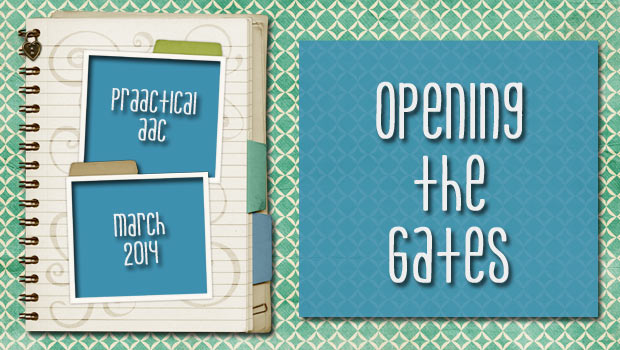
For many users of AAC, the road to communicative competence is an arduous one. Consider the case of JJ, a bright 4 year old with severe motor limitations, who enters a typical preschool with only a few intelligible words. After months of meetings, on the first day of school, his proud parents carry him into the classroom. They fasten him into an adapted chair that they brought for him to sit in and spend a half hour giving his aide instructions about his likes and dislikes, feeding difficulties, and toileting needs. Meanwhile, his teacher introduces him to some classmates, who are amazed, curious, and a little frightened of his unusual chair, constant drooling, grunting sounds, and random, jerky movements. One brave soul offers the child a toy, but JJ’s unruly arms bat it away and won’t let him take it. His would-be friend steps back, a bit confused. As they... [Read More...]
January 27, 2014
by Robin Parker -
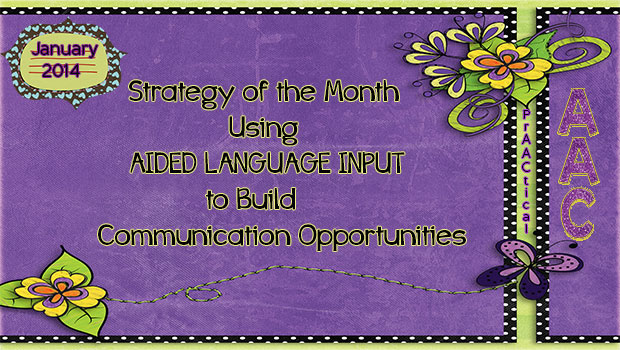
We can not write, speak or do enough Aided Language Input (ALI). If we expect learners to speak AAC, we must speak AAC to them. It is difficult enough to learn a language and imagine if no one spoke it to you in the language you were expected to speak…But there are so many more reasons to do ALI. Aided Language Input (ALI) belongs in the context of communication opportunities. It is modeling AAC style. Once we model a target language concept AAC style, then add the wait and signal strategy, the learner then knows it is their communicative turn. Especially if you wait with the raised eye brow signal. They often will take their turn expressively. But, if they do not take the communicative opportunity to take their turn, there are gestural, visual, verbal, and physical prompts that can be implemented. In other words, they can make use of... [Read More...]
January 10, 2014
by Robin Parker -

STRATEGY OF THE MONTH Supporting Pre-Intentional Communicators Breaking Through with Pre-Intentional & Beginning Communicators of ALL Ages Helping Pre-Intentional Communicators to Cross the Intentionality Bridge More Ideas for Supporting Pre-Intentional Communicators PRAACTICAL THINKING PrAActical Nominations: The 2013 Edublog Awards I was Thinking About Buying an AAC App- Now What? 5 Ways to Encourage AAC Learners 30 P0sts You May Have Missed in November How Much Time Do SLP’s In Healthcare Settings Spend on AAC Services to Children AAC Goes to the Eddies Does AAC Benefit Children with Profound and Multiple Disabilities Throwback Thursday: Talk About Me 2 3 Responses to Programs that Make Kids ‘Prove Worthiness’ Prior ro Providing Access to AAC AAC Vocabulary Lists Throwback Thursday- Past Posts About Pre-Intentional and Beginning Communicators Power Words from PrAACtical Friends A PrAACtical Christmas Carol 8 Ways to Have an AAC Holiday Season A PrAACtical Christmas AACtual Therapy with Shareka Bentham- Started from... [Read More...]
December 16, 2013
by Carole Zangari -
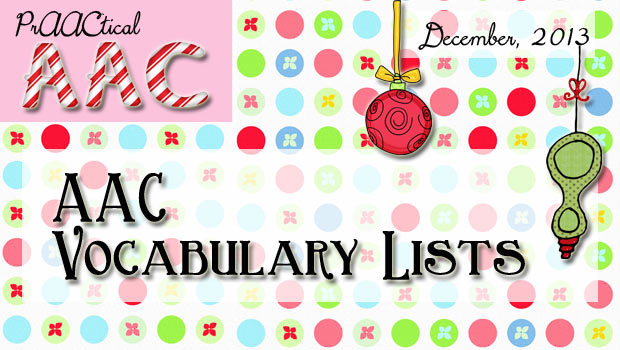
We were looking for some core vocabulary lists the other day and it struck us: Maybe you were, too! Here are some we found, both for core words and other AAC-related topics. Core Vocabulary Adults – Baladin& Iacono, 1999 via Minspeak.com Adults – Hill, 2001 via Minspeak.com Toddlers – Banajee et al. 2003 via Minspeak.com Children [UNL] Preschool Children – Marvin et al. 1994 via Minspeak.com Children (combined sources) – Anderson & Bitner, 2013 Common core related words [UNC CLDS] Young adults [UNL] Older adults [Stuart, et al., 1997, via Minspeak.com] Various classroom, academic, and related lists [Gail Van Tatenhove] ALS [UNL] Break time at work [UNL] Dolch words: PreK through 3rd grade Medically-oriented [UNL] Young children [UNL] Know of one that we should add to the list? Please comment or get in touch so we can add it in. ::::::::::::::::::::::::::::::::::::::::::::::::::::::::::::: UNC: University of North Carolina UNL: University of Nebraska-Lincoln
October 31, 2013
by Robin Parker -
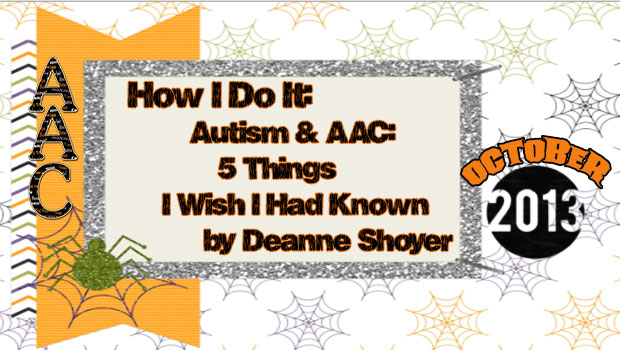
We are so pleased to have connected with Deanne Shoyer from Small But Kinda Mighty and even happier that she is our guest blogger today. Deanne is a mom of twin boys who both are on the autism spectrum. Deanne successfully fundraised to buy iPads for her boys and has been active for more than 3 years in social media and in the special needs app community. She has written about many things but often focuses on implementing AAC in a very PrAACtical way. Please feel free to share this very important post as she highlights AAC, what she has learned, and how it may help others. by Deanne Shoyer at Small But Kinda Mighty (original post at Small But Kinda Mighty) In the title of this post I’ve linked autism and AAC for a specific reason. A lot of the points here are equally applicable to people who have a... [Read More...]
October 17, 2013
by Robin Parker -
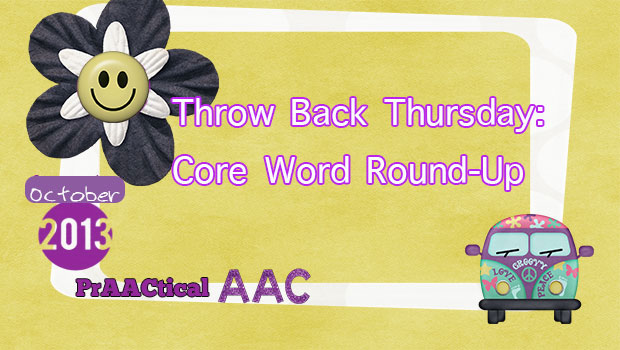
Core Word Round-up! Core Word PrAACtice Ideas Magic Moments: AAC Intervention with Stop and Go App Magic Moments with Toca Store Magic Moments with Sentence Builder Magic Moments with Verb Circus HiJAACked! Putting an AAC Twist on Gen Ed AACtivities: The Hallelujah Flight AAC Goes to PreSchool 5 PrAACtical Uses for Flashcard Apps Visual Language, Core Words, & Martin Luther King Can I Ask You A Question? Breakthroughs with Bubbles with Tanna Neufeld 14 Valentine’s Day Activities, Love, Literacy, & Learning AAC Learning with Play Dough by Jamie Cooley 5 Ways to Use Power Point in AAC Intervention 5 PrAACtical Thoughts on Catch-Up Conversations How I do It- Marlene Cummings Shares an Implementation Toolbox AACtual Theray with Tanna Neufeld- Use Your Best Spud To Teach Vocabulary How I Do It- Marlene Cummings On Strengthening the Communication... [Read More...]
August 30, 2013
by Robin Parker -

by Carole Zangari, originally published on August 27, 2012 “How was school?” (Good) “What did you do?” (Nothing) This scenario plays out in many cars and kitchens in the after school hours and it can be hard to know who is more frustrated: the kids for being asked or the parents for not getting satisfactory answers. And still, we repeat the process day after day. Of course, we want to know the fine details of what happened and how our children felt, but in some cases, we’d settle for ANY school-related conversation at all. I’ll be the first to admit that it took me way too long to get the hang of how to get information about my children’s school days, and it seemed like just when I did, pow! They were pre-teens and then teenagers. New rule book. Here are some ‘lessons learned’ along the way about those afterschool conversations and... [Read More...]
April 20, 2013
by Carole Zangari -
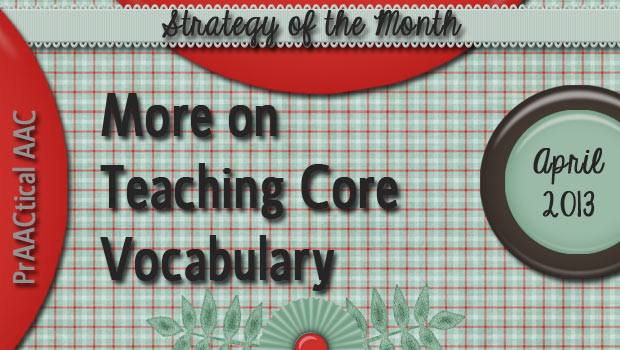
Last week, we talked about two key strategies for teaching core language: using aided language input and creating frequent opportunities to teach and elicit core words. In today’s post, we’ll expand the number of words and discuss two additional considerations for teaching core words. Aided language input is always important in working with beginning users of AAC. It exposes them to their new means of communication, provides them with a competent model of their AAC system, and introduces them to words and symbols they don’t yet know within a meaningful context. It also forces us to slow down when talking, something that can be very beneficial when you consider that many beginning users of AAC also have difficulty processing oral language. (It may take them longer to decode what they’re hearing and they may have to concentrate more than the average kid.) If you’ve actually tried pointing to symbols as... [Read More...]









